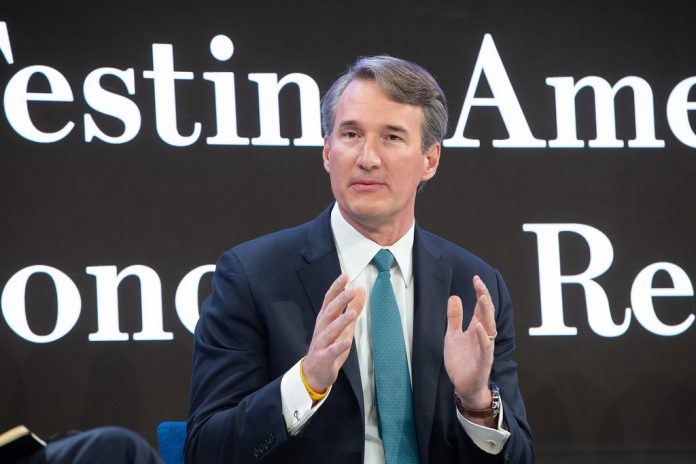Virginia Gov. Glenn Youngkin’s administration made the state’s commitment to leave the Regional Greenhouse Gas Initiative (RGGI) by the end of 2023 official, by publishing a repeal of implementing regulations in the state register on July 31.
Environmental activists have vowed to challenge Virginia’s exit from the interstate compact in court.
The RGGI, established in 2009, is an interstate cap-and-trade program among six New England states, along with Delaware, Maryland, New Jersey, New York, and Virginia. Cap-and-trade programs limit emissions by establishing a specific amount of carbon dioxide businesses or other organizations may produce and allowing them to purchase additional capacity from those who have not used their full production allowance.
An entity that emits above the cap without purchasing additional allowances will be penalized financially. RGGI requires power plants larger than 25 megawatts in capacity to purchase emissions allowances at auction for each ton of carbon-dioxide emissions they produce. There are a limited number of allowances issued, and these are gradually reduced each year.
Youngkin Campaigns on Leaving RGGI
Youngkin originally promised to remove Virginia from RGGI on taking office as governor in 2022. Barring any legal issues, the withdrawal order will go into effect on August 30 after a 30-day public comment period.
Republicans in the General Assembly put forward multiple bills during the Virginia’s 2023 legislative session seeking a RGGI withdrawal, but they were consistently voted down by Senate Democrats, who had majority control of the chamber. Virginia joined RGGI in 2021 after passage of the Clean Energy and Community Flood Preparedness Act through the then-Democrat-controlled General Assembly in 2020.
With Youngkin in charge, the Virginia State Air Pollution Control Board voted to withdraw the commonwealth from RGGI by the end of the calendar year, in June,, says Stephen D. Haner, a senior fellow at Virginia’s Thomas Jefferson Institute for Public Policy.
“Virginia’s Air Pollution Control Board has already repealed the regulation that required our power producers to purchase RGGI carbon allowances, and the RGGI compact has been notified that Virginia is leaving when the current three-year contract period ends in December,” said Haner. “Environmental groups and the agencies that have enjoyed spending the [RGGI] tax dollars have notified the state that a lawsuit is coming, but unless a court enjoins the state we are out in just over four months.”
Environmental Lobbyists Fight Withdrawal
The Southern Environmental Law Center (SELC), a lobbying organization representing Appalachian Voices, the Association of Energy Conservation Professionals, Faith Alliance for Climate Solutions, and Virginia Interfaith Power and Light, filed a notice of appeal in Richmond City Circuit Court, on July 31. The notice of appeal by SELC will be followed by filing a lawsuit by the end of August.
“Throughout this process, the [Youngkin] administration has brushed aside serious questions concerning their lack of authority to take this action, and ignored the thousands of Virginians who have steadfastly opposed this misguided process,” said SELC Senior Attorney Nate Benforado. “We are disappointed it has come to this but look forward to presenting our arguments to the court.”
RGGI Participation Not Required
Virginia is not legally required to participate in RGGI and so the state, as is its right, is withdrawing, Travis Voyles, Virginia Secretary of Natural and Historic Resources, said in a statement to The Hill.
“Our State Air Pollution Control Board has acted and believes that Virginia is not required to be in RGGI and that the citizens of Virginia should not be subjected to this unnecessary tax,” Voyles said. “The Office of the Attorney General confirmed the State Air Pollution Control Board has the legal authority to take action on the regulatory proposal using the full regulatory process—and the Board voted to do just that—furthering Virginians access to a reliable, affordable, clean, and growing supply of power.”
Anyone who cares about the Virginia’s economy and its residents should be pleased with the states’ decision to withdraw from RGGI, said Lynn Taylor, president of the Virginia Institute for Public Policy.
“As anybody interested in business or economics understands, the consumer, the worker, or the investor ultimately bears the cost of taxation and regulatory compliance on businesses,” said Taylor. “In the case of the RGGI …the costs of re-structuring current energy generation, and losses caused by Virginia’s diminishing competitiveness in the Pennsylvania-New Jersey-Maryland Interconnection market have more or less fallen upon Virginia’s families and businesses to address.”
As state-regulated utilities, electric companies in Virginia are guaranteed a rate of return on their capital investment, allowing them to pass costs on to their customers.
“The highly integrated nature of Virgina’s monopoly energy producers acts as a mechanism to drive those additional costs to the end user, the consumer, rather than being absorbed elsewhere in the power industry’s cash flow model.” Taylor said. “As such, we applaud Gov. Youngkin’s announcement to withdraw from RGGI and support continued efforts for Virginia to become more self-sufficient in its power generation capability.”
Tim Benson (tbenson@heartland.org) is a senior policy analyst with Heartland Impact.
For more on RGGI, click here.
For more on Virginia policy, click here.


























